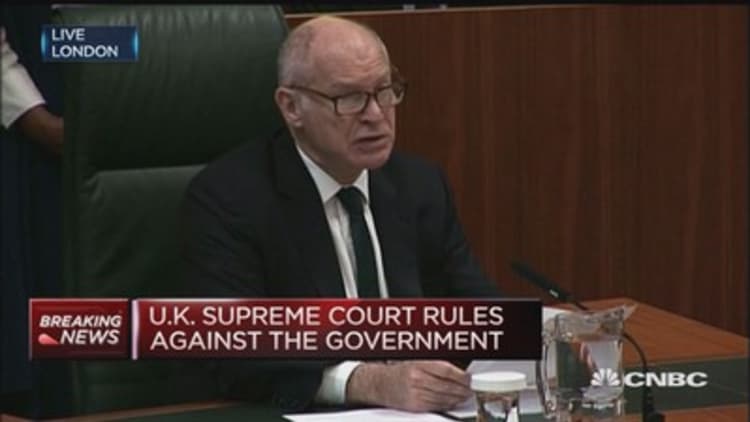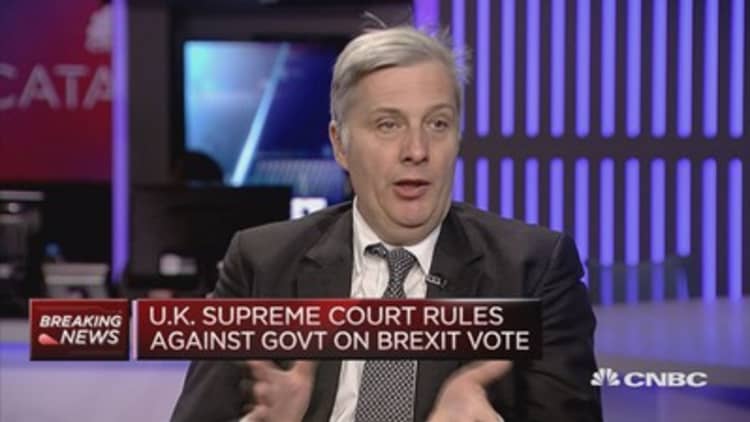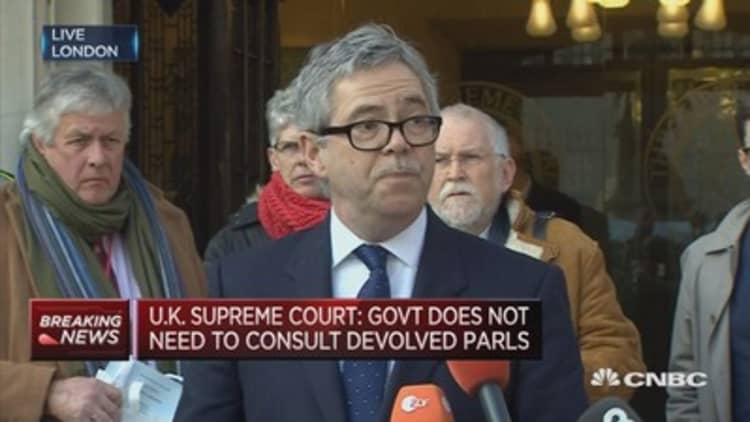
The U.K. government must win a vote in parliament before it can start the Brexit process, the country's Supreme Court ruled Tuesday.
The Supreme Court ruled against government's prerogative powers with a majority of eight to three.
Already sterling has slightly rebounded after trading lower this morning ahead of the result.

Lord Justice Neuberger, president of the Supreme Court who presented the ruling, said that the majority of Justices were agreed that, according to the 1972 Act, which legislated for Britain's access to the EU, government must seek the approval of parliament before altering independent EU law by triggering Article 50, the piece of European law that allows a country to leave the European Union.
"When the U.K. withdraws from EU treaties, a source of UK law will be cut off. Further, certain rights enjoyed by UK citizens will be changed. Therefore, the government cannot trigger Article 50 without government authorizing that course," Neuberger said.
Neuberger said the referendum was of "great political significance" but criticized the lack of planning by the government ahead of the shock outcome on June 24.
"The act of parliament which established (the referendum) did not say what should happen as a result; so any change in the law to give effect to the referendum must be made in the only way permitted by the U.K. constitution - namely, by an Act of Parliament.
"To proceed otherwise would be a breach of settled constitutional principles stretching back many centuries."

Today's ruling also saw the Supreme Court's eleven Justices unanimously rule that U.K. ministers are not legally compelled to consult devolved legislators before triggering Article 50, arguing that relations with the EU are a matter for the U.K. government.
Lord Justice Neuberger said: "The devolution statutes were enacted on the assumption that the U.K would be a member of the EU, but they do not require it."
The outcome brings an element of certainty to Britain's Brexit negotiations and resolves a legal battle that has hung heavy over Theresa May's government since the latter half of last year.
The case was referred to the Supreme Court after the government appealed a High Court ruling in favor of a legal challenge led by investment manager Gina Miller.
Miller's People's Challenge campaign argued that British government could not invoke Article 50 without first seeking approval from parliament.
"This ruling today means that members of parliament we have elected will rightfully have the opportunity to bring their invaluable experience and expertise to bear in helping the government select the best course in the forthcoming Brexit negotiations - negotiations that will frame our place in the world and all our destinies to come," said Miller.
Lord Chancellor Elizabeth Truss added: "Our independent judiciary is the cornerstone of the rule of law and is vital to our constitution and our freedoms. The reputation of our judiciary is unrivaled the world over, and our Supreme Court justices are people of integrity and impartiality."
The decision comes more than six weeks after the Supreme Court heard the case in December 2016.
Further Brexit delays
However, today's ruling could lead to further delays in Brexit negotiations.
It is thought that between 60 and 80 Labour MPs have intentions to vote against the triggering of Article 50, despite calls from party leader Jeremy Corbyn to honour the referendum result.
"What I'm saying to all of my MPs is we've supported the principle of holding the referendum, the referendum was held, it delivered a result - I don't think it's right to block Article 50 negotiations," Corbyn told the BBC on Friday.
The result also faces opposition from dissidents from the Liberal Democrats, the Scottish National Party and Northern Ireland's Social Democrat and Labour Party, many of whom believe it would be unjust to enact Brexit proceedings given the demands of their constituents.
Tim Farron, leader of the Liberal Democrats, said that the party would not vote for Article 50 unless the U.K.'s final Brexit deal was opened up to a vote by the British public.
Scotland's SNP has also vowed to put forward 50 "serious and substantive" amendments to U.K. government legislation, despite welcoming the Supreme Court's ruling.
June's referendum saw 51.9 percent of Britons vote to leave the EU, while 48.1 percent opted to remain. However, Scotland, Northern Ireland and parts of the South of England voted overwhelmingly to remain as part of the 28-country bloc.
The ruling comes exactly one week after May sought to provide clarity on Britain's future outside of the E.U.
In a speech held in London last Tuesday, May reiterated her intentions for a speedy exit and told an audience of diplomats and officials that Britain would leave the single market and develop a "truly global Britain".
She also said that government would seek approval from both houses of parliament on Britain's final deal with the EU – a vote which is independent of today's result.
May has previously stated intentions to trigger Article 50 by March 2017, starting the two year negotiation period with the EU.

